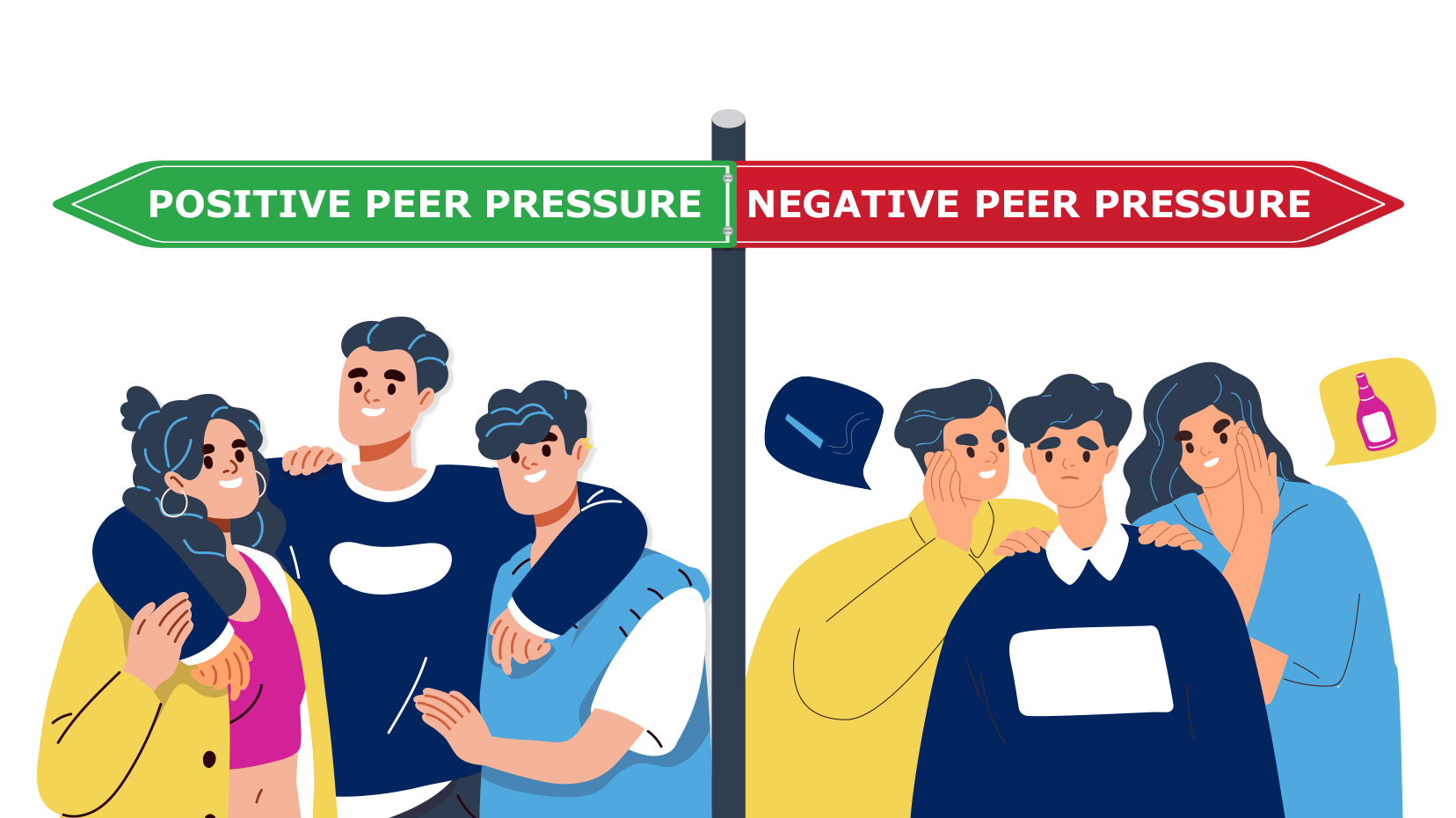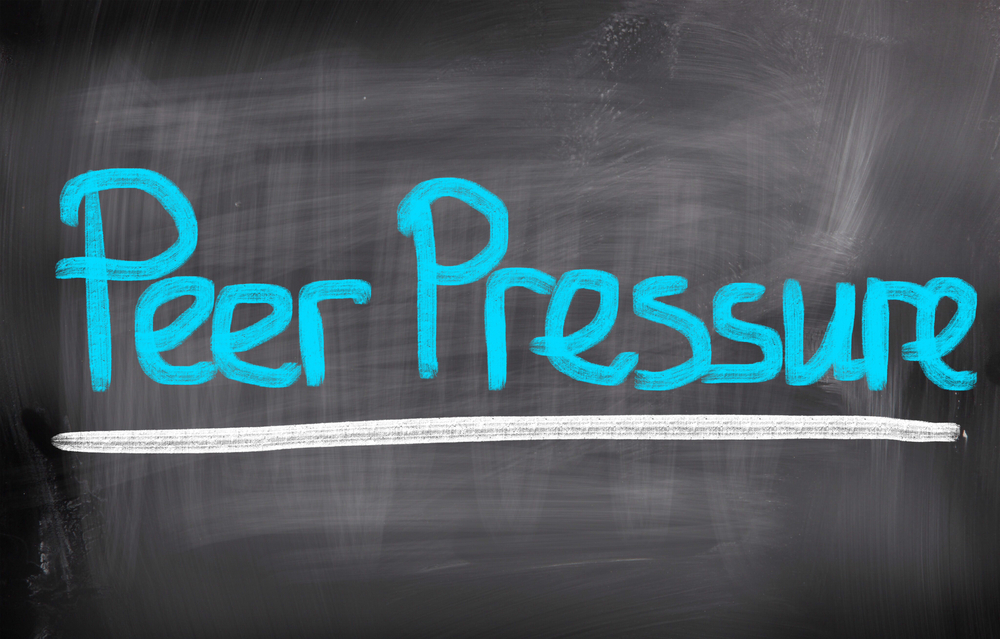How to Tackle Peer Pressure
Tips and Advice
5 mins read
Share

Updated at: 25 November, 2025
Published at: 08 December, 2022
By Hagar Samir
How to Tackle Peer Pressure
Tips and Advice
5 mins read

Updated at: 25 November, 2025
Published at: 08 December, 2022
By Hagar Samir
Share
Peer pressure is one of the problems you might face as a student wanting to make friends. Some people just don’t know when to stop! One second, you’re getting to know each other and becoming friends, and the next, you find yourself under so much pressure because of that friendship. So, what can you do? Do you simply cut the friend off? Or are there ways you can build a friendship while keeping your boundaries up?
Of course, there are ways where you can have friends without the pressure or the stress. After all, this is what friendship is! If you find yourself needing to dress or act in a certain way, letting others copy your work because you don’t want to upset them, taking dangerous risks that you’re not comfortable with, engaging in bullying or cyberbullying, or projecting a false persona on social media because you’re scared they won't like you or want to be your friend anymore if you show who you truly are, then you probably need to start taking action in order to break this cycle.
How to Tackle Peer Pressure
Don’t worry! There are things you can do to stop this once and for all and hopefully learn how to create a healthy environment for yourself to be in with no toxicity or pressure. It is not impossible! Many have managed to do that before, so why can’t you? Here are some strategies that can help you handle peer pressure.
1. Pay attention to how you feel.
If something doesn’t feel right, it probably really isn’t! Always trust your instinct in situations like this. You have to be sure that your gut feeling will never lie to you! Ask yourself, “Is it the right thing to do? Should I be doing this?” You probably already know the answer. Let’s say your friends are okay with it and are encouraging you to do it; if you feel like it’s not right, odds are it really isn’t.
2. Have a friend who will stand with you.
It is so important to have friends with similar beliefs and values. If you choose friends who push you to be better, encourage and support you, and respect your boundaries, your life will be much easier! It can really help to have at least one other peer who is willing to say "No," too. This takes a lot of the power out of peer pressure. It's great to have friends who will have your back and respect you when you don't want to do something.
3. Get support from a trusted adult.
If you’re facing peer pressure that’s hard to handle, get advice from an adult you trust. Talk to a college professor, school counselling, your parents, or someone you trust from your family. A trusted adult can listen to you, provide you with the support you need, give you good advice, and help you with strategies that might work in your situation. They can also help prepare you for the future if you ever face this kind of situation again!

4. Help a friend.
Helping a friend in a similar situation could give you the courage to face your own! If you prove to yourself and your friend that you can handle peer pressure, it might just give you a push in the right direction and help you stand up for yourself and hopefully end any kind of peer pressure you’re facing!
5. Give an excuse.
It is more than okay to say “no” without giving an explanation or apologising, but it could be easier to decline something when you already have a reason. A medical reason, like an allergy that makes it dangerous for you to do something, could be used. You can even just use the good old “my parents need me home” if you feel it would be best to leave the situation altogether. Of course, you never have to lie! But this could come in handy if you’re in a situation where you can’t think of something else. You can have a secret code to communicate with parents. Something you can say or text to them that lets them know you need out of a situation. Parents can either call or text to say that you need to come home or that they need to pick you up.

6. Turn that pressure into something positive.
Peer pressure is not always a bad thing. For example, peers can pressure bullies into acting better toward other kids. When enough get together, peers can pressure each other into doing what's right! You can also use that peer pressure to do better in school! Instead of being upset over what’s happening, put that pressure into work and use it to do better.
7. Change the subject if you’re uncomfortable.
Sometimes people can get the message when you start changing the subject. If they start suggesting something you’re not comfortable with or you don’t want to participate in, you can change the subject to something you’re more comfortable with and want to talk about. Most people, in this case, will get the hint that you don’t really want to participate in whatever is happening and will, hopefully, leave you alone!
8. Journal your feelings.
Another way you can turn peer pressure into something positive is by journaling. Dealing with emotions can be really difficult, so use a journal to sort out your feelings. This will also help you cope with stress! Journals could be your safe haven and stress reliever where you write your honest feelings. You can also use it to read about things you’ve done in the past and how you handled them for future reference!
9. Keep yourself busy with healthy activities.
You can always avoid peer pressure by doing healthy activities that you genuinely like! Doing activities can help you meet other people with shared interests and help you spend your time doing what you enjoy. Try different activities until you find one you love. For example, you can write, play sports, learn a musical instrument, exercise, or even learn photography! Not only will this help you health-wise, but it will also help you avoid peer pressure and actually enjoy your time doing something fun!
Everyone has peers. You may not consider all of your peers to be friends, but they can all influence you. Peer pressure can be positive or negative. When peer pressure is positive, it pushes you to be your best. When you give in to negative peer pressure, you often feel guilty or disappointed with yourself for acting in a way that goes against your beliefs or values. Still, you can control this pressure and turn it into something good!
Frequently Asked Questions
What causes peer pressure?
The causes of peer pressure include the need to fit in and low self-esteem. You can feel like the only way to fit in is to do what your peers tell you to do. Also, fear of rejection; if you think your friends will not hang out with you or like you if you don’t do what they tell you, then that is peer pressure.
How can I stop peer pressure?
Pay attention to how you feel around certain people. Do you always feel stressed and nervous? Or are you relaxed and feel like you can be yourself? If it’s the former, then you probably need to distance yourself from these people. Also, learn to say “no” without being afraid of your peers.
Tips and Advice
By Hagar Samir
Share
Tips and Advice
Updated at:
Published at:
By Hagar Samir
Share

